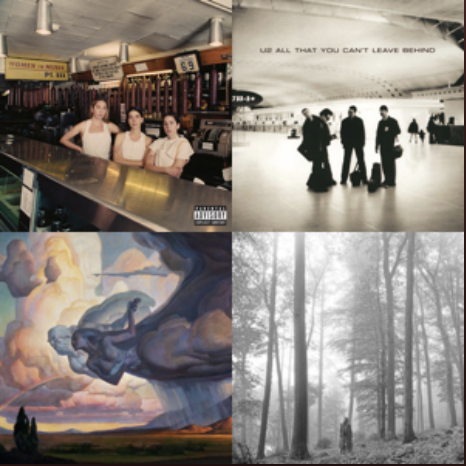Later this month I will pay a visit to Chicago’s Harold Washington Library. It holds nine floors of books, with one whole floor devoted to literature. I’ll have to restrain myself from adding thousands of titles to my to-read list. This confronts me with something that faces every art aficionado eventually: Art takes more time than I have. I will never read all these books, and it’s the same with my own writing–the projects in my head vastly outnumber the actual hours I can spend on them.
The sentiment is an old one. Hippocrates said, “Ars longa, vita brevis.” Longfellow translated this, “Art is long, time is fleeting.” Some artists, like Grace Paley in a Paris Review interview, take this to mean that art is not the only thing they want to give their time to. Others take it to mean “life is short, but art endures.” Taking the translations together, a quandary arises: Art’s endurance makes it seem worthy of life’s time, but life is short and life is more than art.

Photo: David B. Thomas
Ron Thomas has been producing and recording original jazz and classical music since the 60s. This enables him to look back over a strong musical legacy and forward to work ahead, and to comment on the relationship between art and time.
In terms of work already accomplished, Thomas has released eleven albums. If you begin to talk shop with him, you’ll discover he knew John Cage and Karlheinz Stockhausen. In 1964, when Stockhausen was Visiting Professor at the University of Pennsylvania, Thomas studied with him (or, as he puts it, “became glue on Stockhausen”). Thomas teaches piano and composition with “a full, full heart,” he says. “It’s full-throated teaching.” He writes essays on aesthetics, musical theory, teaching, and more. If you visit him, I promise you won’t leave without a new book or photocopy in hand, fodder for new art.
His music is at once ethereal and comforting. It delves into imaginative, cerebral themes—Blues for Zarathustra is the title of his 2008 collaboration with Paul Klinefelter, and 2003’s Scenes from a Voyage to Arcturus explores David Lindsay’s novel A Voyage to Arcturus.
In thinking of work ahead, Bartόk’s life and music have been on Thomas’s mind, and he hopes this will inspire new music drawn from the new experiences this stage in his life is presenting.
Pacing and Discipline
Working with an art form for several decades has given him a good sense of pacing. “I’ve never thought of composing as something I have to do every day,” he tells me over one of his four or five cups of coffee for the day. Instead, he laughs, “My craft is all designed for this total freedom that I seem to need.”
He doesn’t force himself to compose for long swaths of time every day, nor even necessarily every day. His creative routine is much more exuberant than that. He believes that even though it may often make the artist sweat, his artistic process needs to bend away from “negative stress” and instead capture “ultimate liberty and ultimate fun.”
The one rule he does set for himself is not to end a work session with something questionable. He has to reach the point where he can pick up from where he left off. When he writes something good, though, he says to himself, “That’s it for the day,” and then, he says, “I go and jump around the room. There’s only so much creativity I have in me. I don’t want to drain it dry.”
In writing classes, my professors always told aspiring writers, “Write every day.” They advised this, I’m sure, because once we’d left the rigor of academic deadlines, who knows what non-artistic deadlines would swallow our days whole?
“But do you want to write every day?” Thomas asks me. He has a good ear for artistic anxiety.
“Partly,” I say, “I enjoy giving myself this gift of time, and partly, I feel like I have to do this if I want to be a good writer.”
“I would drop the one that says ‘I must do this every day if I am going to be a good writer.’”

When it comes to being disciplined as an artist, Ron Thomas remembers that “it’s a discipline of the imagination,” and he leaves room for discovery. His musical craft is “all about spontaneity. I want my music to be totally fresh. Maybe ‘alive’ is a better word.”
He believes that work born of surprise and joy is the ars longa, the work that endures.
Time and Detachment
This kind of art may be spontaneous, but it takes a great deal of freedom and space to cultivate, so that even when an artist is not making art, art might still be in the making. “You need to digest things,” says Thomas. Whenever he says “you need to,” his tone holds recommendation, more like let yourself do this.
Taking time to digest life and to let other art forms sink in means cultivating some detachment from the artistic work. Feeling time pressure can push artists to compose too frequently, at a faster pace than new inspiration actually comes. Thomas relates the story of painter Joan Mirό standing in front of his canvas for hours on end as idea after idea would come. Mirό would stand and the ideas would flow, but he would not paint. When he’d accrued several really good ideas, then he would begin to paint them. “You should reject some things,” Thomas advises.
Similarly, Picasso’s pattern, says Thomas, “if a painting resisted completion because of some undetectable formal flaw, was to find the wonderful thing in that work and then destroy it.” This would yield a breakthrough, “and the final form would come successfully: the one wonderful thing to which he was too emotionally attached” was setting the whole piece off balance. People asked Picasso, “But what happens to the wonderful thing?” And Picasso would answer, “It comes back.” Thomas repeats, “It comes back.”
This holds true for Thomas’s own work. He has stumbled across fragmentary work he’d composed and abandoned fifteen years ago and been able to incorporate it. This perspective frees him to compose and reject, knowing that his process is fluid.
Competition and Hurry
His process not only banishes critics but also takes a gracious and realistic approach to competitors. Competition can easily add a sense of hurry and negative stress to the artistic process. He remembers his father saying that an artist’s only competition is with himself or herself.
“If I thought too much about Stravinsky and Miles Davis, I wouldn’t get out of bed in the morning. How could you possibly be in competition with them? It’s ridiculous!”
As a teacher, too, he dismisses thoughts of competition, favoring instead the saying, “Poor is the pupil who does not surpass his master.”
The Sound of Time and the Voice of the Artist
Even as he discusses his process, Thomas keeps perspective: what works for him won’t work for everyone. The discipline of art, he says, is not universal. “Unilateral rules are counter-productive. I have tricks to keep myself from thinking too much about the seriousness of what I’m doing so I don’t get too nervous about it, but you have to select and reject the tricks you will use. As long as it’s legal, and as long as it works for you.”
Thomas urges artists to find their own voices among the clamor of critics and voices that tell them what they “have” to do as artists. What works for one may not work for another. It’s true, too, that the voices that remind artists about time and tasks to be accomplished can become part of the chorus of critics. They smack of the practical yet disciplinary reminders “Be back by midnight” or “Hurry up, you’ll be late.” Hippocrates himself can thus become no more than a disgruntled adult, saying, “Kid, you haven’t got all day.”
So, if it helps you, listen to the tock of clock-hands or the screech of clockwork gears. From this sound, find focus. Hear, too, the tumble of future piano keys. Trust that even though life is fleeting, the days allotted are enough, and in them, find space to enjoy the freedom and fun of the art that has been given to you.



